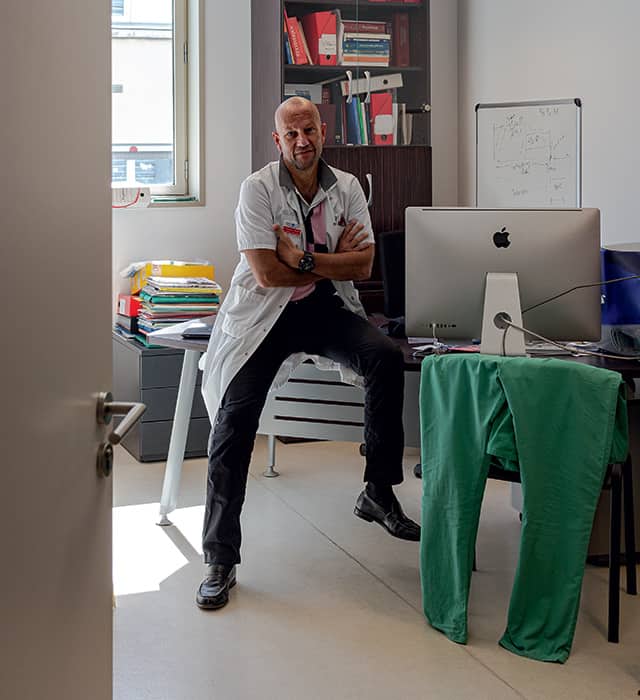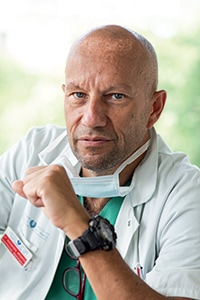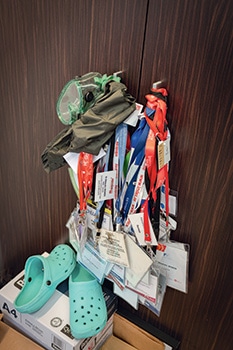Alexandre Mignon (E.06): A Doctor on the Front Lines

Alexandre Mignon (E.06), an anesthesiologist-intensivist at Cochin Hospital in Paris, served on the front lines in the battle against the coronavirus. Critical of the way the healthcare crisis has been handled, this doctor-entrepreneur has decided to shake things up.

2002: Completed his medical studies at Paris Diderot university, specializing in anesthesiology-intensive care.
2006: Earned an MBA in Leadership and Change Management at HEC 2011: Co-founded the university laboratory iLumens.
2015: Visiting professor at Columbia University, New York City
2020: Launched the CovidIA (artificial intelligence) project
As his deep voice reverberates through the telephone’s speakers, it’s obvious that this is a man in a hurry. “We can do the interview right now; I have 10 minutes,” he announces. Hmmm, that might be a bit short. He explains, clearly on edge, that he’s working “like a maniac” and sleeping only three hours a night. “But call me Friday morning,” he eventually offers.
That Friday, he picks up the phone almost instantly. We can hear him compose himself and take a deep breath before he begins to speak. It’s exactly one month since the lockdown started. He came down with the virus himself at the end of March. He had a fairly severe case, he explains, but he didn’t have to be hospitalized. Now back on the job as an anesthesiologist-intensivist at Cochin Hospital, he is obviously exhausted but also very ready to get something off his chest.
“I’ve got a big mouth, in any case. I just can’t keep quiet,” he explains right away. After first praising those he calls “the best”, the “unsung heroes of the pandemic: nurses’ aides, nurses, orderlies, doctors… all those people working right in the thick of things who go above and beyond to provide the best possible care for their patients,” he soon begins to focus on a darker side of the crisis.
He doesn’t hold back. “We did some really incredible things,” he reveals. “We anesthetized people using veterinary drugs. We left people naked lying right next to each other in recovery rooms, without any privacy whatsoever. The quality of care was bad for both Covid+ and Covid- patients.” A harsh reality, far removed from his medical studies at Paris Diderot university in the 1990s or his work with his thesis advisor, the eminent geneticist Axel Kahn. A crisis whose daily challenges have nothing to do with what he teaches his students at Descartes University, where he has been a professor of anesthesiology-intensive care for the past 15 years.
Cold fury

His remarks are a lot angrier than the things he has said on TV and radio. “I’ll never say on television that we didn’t care for patients properly. I’ll say we did it well. I’ll never say that we did a triage of patients, whereas of course we did, in order to provide better care for VIPs than we gave ordinary people,” he reveals with cold fury. Alexandre Mignon is clearly ready to tell all. On the telephone, he talks fast and he talks a lot. It’s hard to get a word in and ask questions. He’s very angry at the way authorities have managed the crisis, and at the hastily thrown together lockdown policy that resulted in “whole groups of people contaminating each other.” For him, what happened in the Seine-Saint-Denis district is an example. “Covid 19 is a poor people’s disease. The deaths are from that district, number 93. For them, the lockdown was a catastrophe. Confining whole families in tiny apartments where grandparents live with their children and grandchildren resulted not only in transmitting the virus but also in increasing stress, anxiety and aggression. People just fall apart.” The growth in cases of domestic violence since the beginning of the crisis backs up what he is saying. In mid-April, the 119 emergency number for signaling that children are in danger had received 89% more calls than at the same time last year.
As for medical personnel, this doctor fears a general meltdown. “They have been under too much pressure. We’re going to see burn-outs and some cases of post-traumatic stress.” But what really makes him furious, as the number of people hospitalized goes down, is the return to “business as usual” at public hospitals. “The policy is to get back to scheduled activities. Because, you know, we can’t let the public hospitals lose any market share to private hospitals…. You see how it works?” Alexandre Mignon is disgusted, but not beaten. While still serving on the front lines at the hospital, he has decided to write a book about the healthcare crisis as seen from the inside. He explains, “I’ll talk a little about the best and a lot about the worst.”As for medical personnel, this doctor fears a general meltdown. “They have been under too much pressure. We’re going to see burn-outs and some cases of post-traumatic stress.” But what really makes him furious, as the number of people hospitalized goes down, is the return to “business as usual” at public hospitals. “The policy is to get back to scheduled activities. Because, you know, we can’t let the public hospitals lose any market share to private hospitals…. You see how it works?” Alexandre Mignon is disgusted, but not beaten. While still serving on the front lines at the hospital, he has decided to write a book about the healthcare crisis as seen from the inside. He explains, “I’ll talk a little about the best and a lot about the worst.”
Doctor Geek
In spite of all this upheaval, he is “firing on all cylinders,” he assures us. It’s easy to believe. After all, this energy is in line with his personality and professional choices. As he reveals in his profile on LinkedIn, he sees himself first and foremost as an “agent of change”. His CV is another clue: he’s a doctor-entrepreneur who’s constantly evolving. After earning his executive MBA in Leadership and Change Management at HEC, he co-founded, with his Paris Descartes University colleague Antoine Tesnière, the university laboratory iLumens. This simulator dedicated to medical instruction allows students to operate in three dimensions, on screens. The platform, which is now being used at three universities (Descartes, Diderot and Paris 13), almost makes traditional lecture-based courses obsolete. He also participated in the development of a healthcare simulation MOOC for Columbia University in New York in 2015. An enthusiastic technophile, he is fascinated by artificial intelligence, which is at the heart of his latest project, Covid IA. Alexandre Mignon is obviously not someone willing to stand still. Along with his drive to discover new ways to fight the coronavirus, he is ready to speak out openly and to make sure that we learn from this exceptional crisis.
Interview by Hélène Biélak
Published by La rédaction

